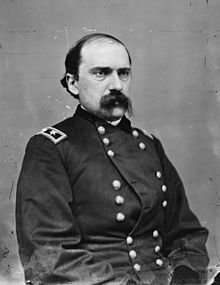Edward Moody McCook
Edward Moody McCook (born June 15, 1833 in Steubenville , Ohio , † September 9, 1909 in Chicago , Illinois ) was a lawyer , general of the US Army , governor of the Colorado Territory and a successful businessman.
Early life
McCook was born into a family of officers. Four of his brothers and ten cousins served as officers in the civil war, and in addition to him, five other family members achieved the rank of general in this war. Young McCook moved from Ohio to Colorado in 1848 and on to the Kansas Territory in 1849 . There he settled as a lawyer and was elected to the territorial House of Representatives in 1859.
In the Civil War
At the beginning of the Civil War in 1861 McCook went to Washington, DC and worked briefly as a secret agent for the Union government. His task was to obtain militarily important information. Soon afterwards he joined the cavalry of the regular US Army as a lieutenant . A little later he became captain of the volunteers and served as such in a cavalry regiment from Indiana . By mid-1862 McCook had reached the rank of colonel and commanded a cavalry brigade at the Battle of Perryville . In the Battle of Chickamauga , McCook was already in command of a division of the Union forces.
On April 27, 1864 McCook was made Brigadier General of the Volunteers and entrusted with command of a cavalry division of the Cumberland Army . During the Atlanta campaign in July 1864 he was involved in the destruction of railroad lines behind the Confederate troops with his subordinate 3,600 cavalry soldiers under the command of George Stoneman . Another goal of the division was the liberation of 32,000 captured Union soldiers from the Confederate POW camp Camp Sumter . This did not succeed, however, as McCook's troops were defeated by the Confederate cavalry under Joseph Wheeler in the Battle of Browns Mill near Newnan, Georgia. The Union's losses were 950 men, 1200 horses and two artillery pieces. During these cavalry actions in Georgia, McCook got a reputation for tolerating looting of civil property by his soldiers and even encouraging them to such attacks. After the capture of Atlanta , McCook's cavalry division was moved to Tennessee to assist Major General George H. Thomas in fighting the Tennessee Army under General John Bell Hood . In the course of the Franklin-Nashville campaign , McCook distinguished himself particularly.
In March and April 1865, McCook commanded a division in Wilson's raid through Alabama and Georgia, and the Battle of Selma , in which the Confederate cavalry under the command of Nathan Bedford Forrest was defeated. In early May, McCook was tasked with establishing Union government control over Florida . After Florida's Confederate Governor John Milton had shot himself rather than surrendering to the Union troops, the last Confederate units in Florida surrendered to McCook on May 13, 1865. On May 20, 1865 leaving McCook in Tallahassee , the Emancipation Proclamation President Lincoln , bringing slavery in Florida de facto came to an end. On the same day his cheering men hoisted the US flag over the Florida Capitol.
Soon after, McCook was named a Brevet Major General of the Volunteers and was highly praised by his manager, James H. Wilson .
After the Civil War
In 1866, McCook left the army. President Andrew Johnson appointed him US Ambassador to the Kingdom of Hawaii that same year . He held this post until 1869. McCook then helped build the Colorado Territory and was twice appointed governor of that territory by President Ulysses S. Grant . During his tenure as governor, McCook signed the charter of what is now Colorado State University and he was one of the first US governors to campaign for the introduction of women's suffrage . In 1872 McCook was a member of the Republican National Committee , the organizing body of the Republican Party .
After his second term as governor expired in 1875, McCook turned to various private endeavors. He made a fortune by skilfully investing in real estate, mining, and telephone companies.
McCook died on September 9, 1909 in Chicago. He was buried in Union Cemetery in Steubenville. The city of McCook , Nebraska , was named after him.
swell
- Eicher, John H., and Eicher, David J., Civil War High Commands , Stanford University Press, 2001, ISBN 0-8047-3641-3 .
- Warner, Ezra J., Generals in Blue: Lives of the Union Commanders , Louisiana State University Press, 1964, ISBN 0-8071-0822-7 .
See also
Web links
- The governors of Colorado
- Edward M. McCook in the database of Find a Grave (English)
| personal data | |
|---|---|
| SURNAME | McCook, Edward Moody |
| BRIEF DESCRIPTION | American general in the Civil War, governor of the Colorado Territory |
| DATE OF BIRTH | June 15, 1833 |
| PLACE OF BIRTH | Steubenville , Ohio |
| DATE OF DEATH | September 9, 1909 |
| Place of death | Chicago , Illinois |

